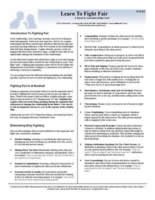All Couples Should Learn To FIght Fair. Here's How
Check out our mini-guide on how to fight fair, and stop letting badly handled conflict cause pain in your relationships. Download it NOW!
Search Our Network Of Business and Personal Development Sites
How To Deal With Difficult People Part 3 - The Passive Aggressive
By Dr. Tony Fiore
Editor's Summary: Passive aggressive people are among the most difficult people to deal with because you can't get them to admit they are angry or feeling hostile. Passive aggressive behavior is exceedingly manipulative and also very common in our society. Here are some ideas about how to deal with passive aggressive people more effectively.
Thirty-three year old Roberto had promised his wife Tina that he would be home after work in time for her to attend her weekly "women's group" at her church. Having only one automobile, Tina was completely at the mercy of Roberto's promise.
You guessed it! Roberto did not show up until 8:45 PM-way too late for Tina to attend her meeting. Rather than being apologetic, however, Roberto explained to Tina (who was outraged at this point) that he "couldn't help it" because "I had to help a friend out who's car had broken down." He lamented "How could I let Michael down? He was best man at our wedding."
Was Tina being unreasonable in her anger? After all, Roberto was helping out a mutual friend. Yet, looking deeper into this situation, turns out that Roberto really didn't want Tina to attend those meetings because it was "putting ideas into her head."
Yet, he couldn't just forbid Tina from attending, so he handled the situation in an underhanded way-sabotaging her attendance in a way that would still make him look good.
After all, he could argue, what reasonable person would get mad at someone who was late because he was helping out a friend?
The Anatomy Of Passive Aggression
Passive-Aggression is a psychological mechanism for handling hostility or anger in an underhanded or devious way that is hard for others to prove. Sometimes the passive-aggressive is aware of what he or she is doing, and other times not.
Yet, the result is the same-things are sabotaged by the passive-aggressive and it somehow is never their fault. A really good passive aggressive is very slippery with excuses, justifications, or alternative reasons for why things go awry. Passive-Aggression may not be expressed directly in behavior-but in words or humor. Sarcasm which communicates hostility is often a tool of the passive-aggressive person, as are jokes made at your expense.
Some common examples of passive- aggressive behavior:
* When conversing with someone who is angry at you, they leave out important information which gives you the wrong impression.
* Talking behind the back of a coworker in a harmful way- gossiping.
*Exaggerating the faults of your spouse (behind his or her back) to your parents while maintaining "sweetness" toward your spouse.
* Playing dumb or inadequate to frustrate someone or gain advantage. .
* Upset with your wife's weight, you "affectionately" call her "pork chop" in public in a way that appears playful on the surface.
Dealing with passive-aggressive behavior is extremely challenging because a really good passive aggressive is very slippery. Often, too, you may not be sure if you have been the victim of passive aggressive behavior-or not. You may be feeling angry and upset, but not sure why or if it is justified.
How do you tell? One way to identify it is to look for patterns in someone's behavior - not just isolated incidents. For instance, if Roberto generally is dependable and is home on time for Tina to attend her meetings, the one "miss" may not be motivated by passive-aggression. However, if he often sabotages Tina's attendance while denying he is doing so, a behavior pattern is evident. What should you do to deal with passive- aggression once you have identified it?
Three tips to cope with passive aggressive behavior:
Tip #1- Directly confront the behavior and ask if the person is angry at you. For instance, ask "You called me pork chop tonight. Do you have issues with my weight?"
Tip #2. Be on guard and don't trust what the person says or commits to. Develop a Plan B. For instance, Tina could have arranged for someone else to pick her up for the meeting in case Roberto didn't make it home on time.
Tip #3. Use assertive communication skills to let a person know how what they do affects you and makes you feel. Try something like "I heard you repeat something that I told you in confidence. That really hurt me; please don't do it again because I would like to trust you."
2005 © Dr. Tony Fiore All rights reserved.
Dr Tony Fiore is a licensed psychologist, marital therapist and certified anger management trainer. He is a Fellow of the American Stress Institute and a Diplomate of National Anger Management Association. He has received advanced training in marital therapy at the Gottman Institute in Seattle,Washington. In addition to his active clinical practice, Dr Tony regularly conducts anger management classes in Southern California, consults and provides trainings to companies for anger and stress management, and trains anger management facilitators. He also publishes a monthly newsletter "Taming The Anger Bee." With Ari Novick, M. A. he has recently published a new workbook/manual: "Anger Management For The Twenty-First Century - The Eight Tools of Anger Control."
Article Source: http://EzineArticles.com/?expert=Dr._Tony_Fiore
 Manage Conflict - Resolve Conflict - Prevent Conflict
Manage Conflict - Resolve Conflict - Prevent Conflict 

